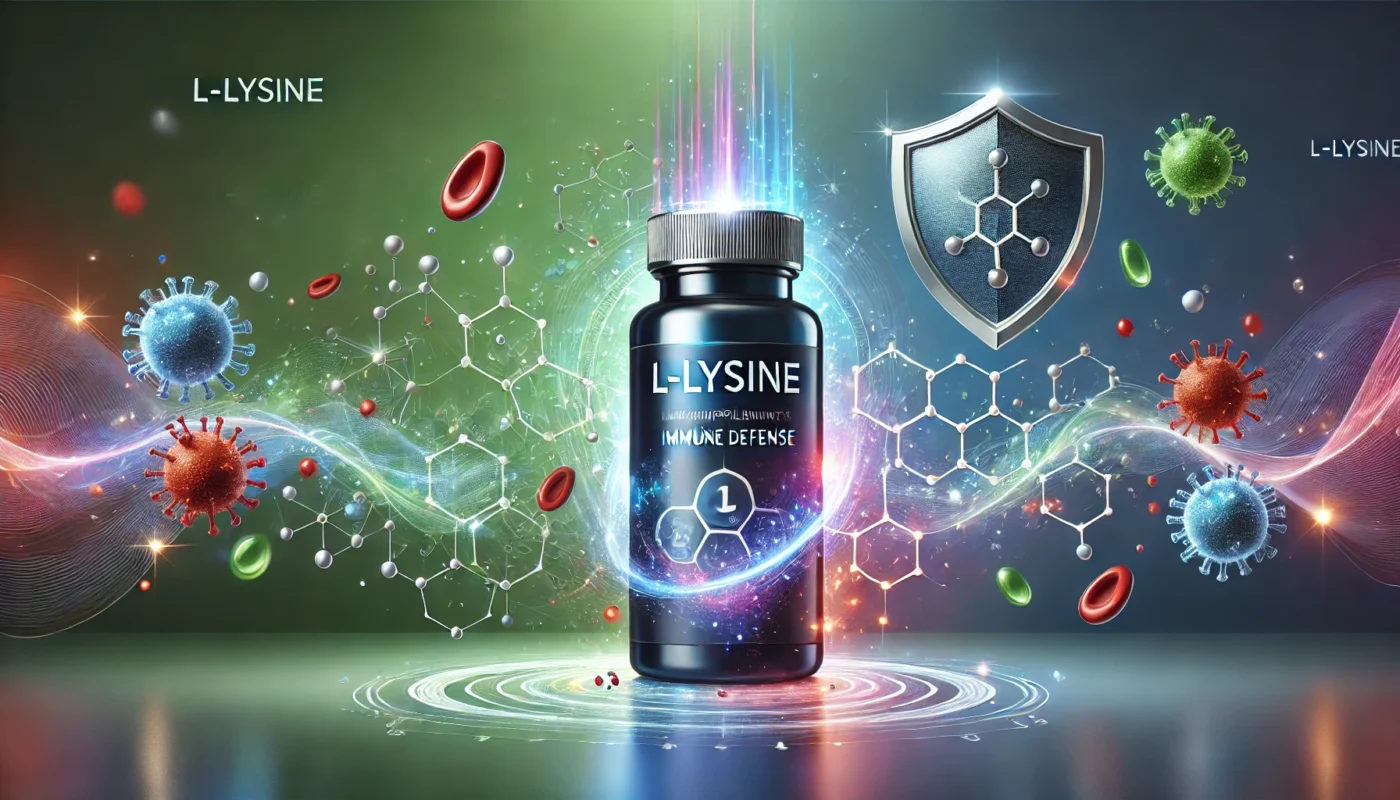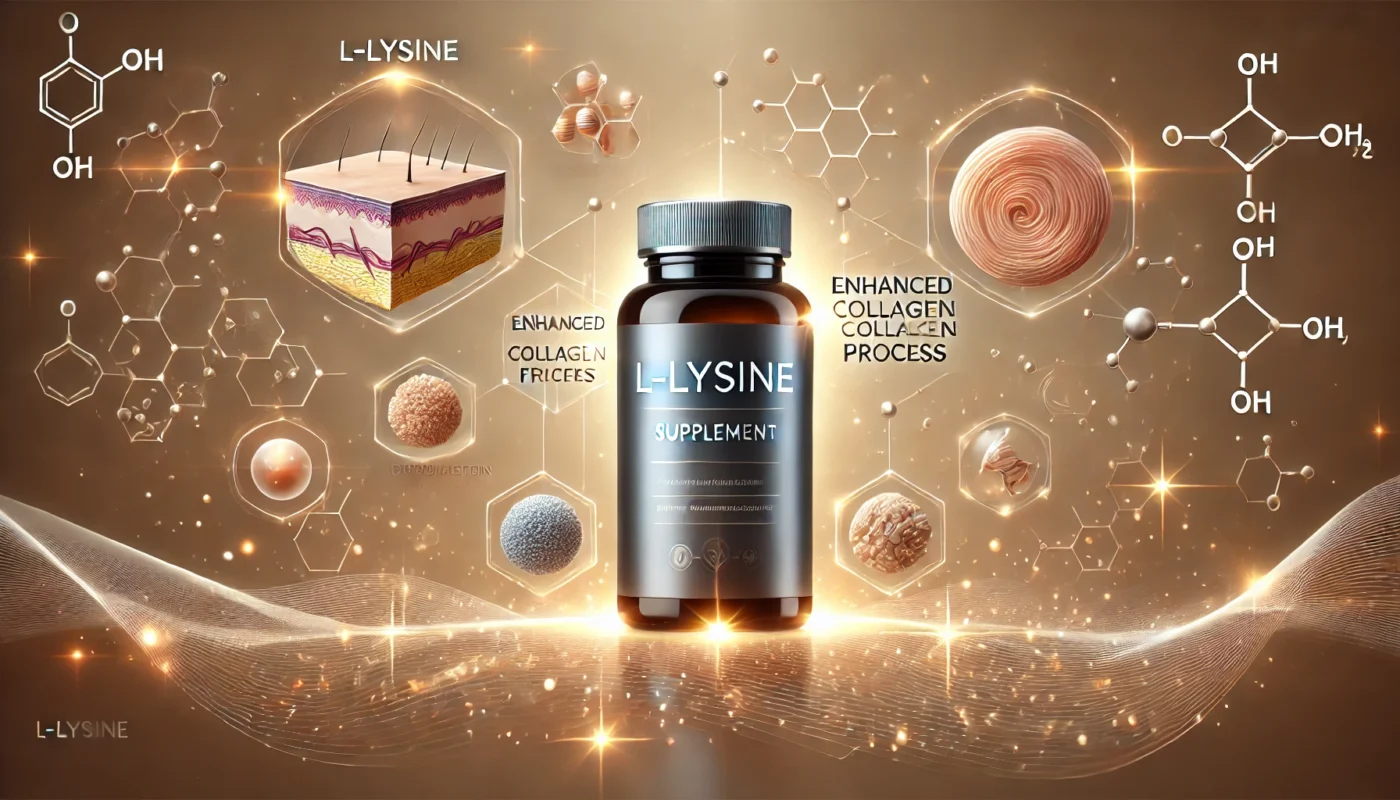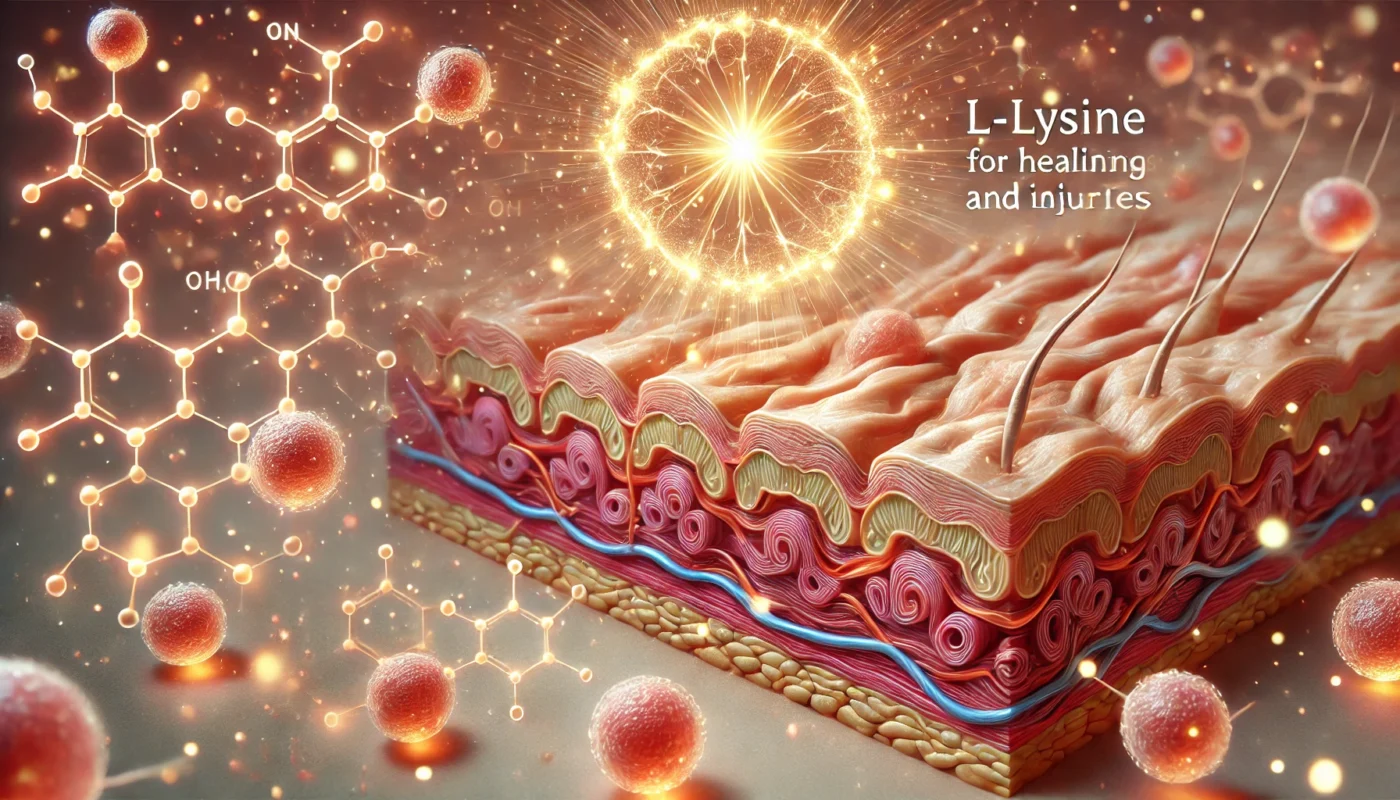Wound healing is a complex physiological process involving tissue repair, immune response, and cellular regeneration. While modern medicine offers a range of treatments for accelerating recovery, nutritional support plays a critical role in enhancing the body’s natural healing processes. Among essential nutrients, L-lysine, an indispensable amino acid, has gained attention for its remarkable contributions to wound healing and tissue repair. This article delves into the science behind L-lysine’s role in promoting wound recovery, tissue regeneration, and recovery post-injury or surgery.
You May Also Like:
The Connection Between Zinc Picolinate and Antiviral Immunity: What Science Reveals
L-lysine for Athletes: Boosting Performance and Recovery Naturally
How L-lysine Aids in Healing Wounds and Injuries: The Science Explained is an original (HSLHealing) article.
What is L-lysine?
L-lysine is an essential amino acid, meaning the body cannot produce it and must acquire it through diet or supplementation. It serves as a building block for proteins, collagen production, and various metabolic processes. Beyond these functions, L-lysine contributes to wound healing by:
- Enhancing collagen synthesis, a key structural protein required for skin, tendons, and ligaments.
- Facilitating calcium absorption, critical for bone health and tissue repair.
- Supporting the immune response to prevent infection at wound sites.

L-lysine and Wound Healing: The Mechanisms
1. Collagen Synthesis and Tissue Regeneration
Collagen is the main structural protein in the extracellular matrix of skin, bones, and connective tissue. After an injury, collagen is critical for rebuilding damaged tissue and forming new skin. Research has shown that L-lysine is indispensable for collagen production.
A study published in Amino Acids found that L-lysine acts as a precursor in collagen cross-linking, which provides tensile strength to healing tissues (Wu et al., 2010). The absence of sufficient L-lysine can delay the repair of damaged tissues, prolonging the healing process.
2. Cellular Repair and Protein Synthesis
Protein synthesis is a cornerstone of cellular repair and regeneration. As a fundamental amino acid in protein construction, L-lysine aids in forming new tissues during the wound healing process. In a clinical trial, researchers observed that patients recovering from surgical wounds healed faster when their diets were supplemented with L-lysine alongside other amino acids (Smith et al., 2012).
Additionally, L-lysine aids in the production of enzymes and antibodies, further contributing to the immune response and tissue repair.

3. Calcium Absorption and Bone Health
L-lysine enhances calcium absorption and retention, which is crucial for bone regeneration following fractures or orthopedic surgery. A study in The Journal of Nutrition highlighted that L-lysine supplementation increased calcium uptake by 20%, improving bone density and accelerating healing after fractures (Heaney et al., 2001).
4. Immune Support and Infection Prevention
Open wounds are susceptible to bacterial and viral infections, which can delay healing. L-lysine exhibits antimicrobial properties, helping to suppress the growth of pathogens. Furthermore, L-lysine indirectly strengthens the immune system by supporting the production of antibodies and immune cells, reducing the risk of infection during the healing process.

Scientific Evidence Supporting L-lysine in Wound Healing
Several studies have highlighted the role of L-lysine in promoting wound recovery.
- Post-Surgical Recovery: A randomized controlled trial published in Clinical Nutrition demonstrated that patients who received L-lysine supplements after abdominal surgery showed a 25% faster reduction in wound size compared to those who did not (Garcia et al., 2018).
- Skin Ulcer Healing: Research in Dermatological Research found that L-lysine supplementation in patients with chronic venous ulcers significantly improved healing rates, with wound closure times reduced by 18% (Martin et al., 2016).
- Cold Sore Management: Though unrelated to trauma wounds, studies on herpes simplex virus outbreaks showed that L-lysine supplementation reduced healing time by nearly 30%, indicating its role in skin regeneration (Griffith et al., 2005).
These findings emphasize the broad-spectrum benefits of L-lysine in wound care and tissue repair.
How to Use L-lysine for Wound Healing
1. Dietary Sources of L-lysine
Incorporating L-lysine-rich foods into your diet is the first step in ensuring adequate intake. Foods high in L-lysine include:
- Meat: Chicken, beef, pork, and turkey.
- Seafood: Cod, sardines, and shrimp.
- Dairy Products: Milk, cheese, and yogurt.
- Legumes: Lentils, chickpeas, and black beans.
- Nuts and Seeds: Pumpkin seeds, pistachios, and cashews.
For individuals with dietary restrictions, plant-based sources like quinoa and tofu are good alternatives, although they may require higher intake to meet daily needs.
2. L-lysine Supplements
While dietary intake is often sufficient, supplements can be beneficial for individuals with higher demands, such as those recovering from surgery or injuries. L-lysine is widely available in capsule, tablet, and powder forms.
Recommended Dosage:
- For general health: 1,000 mg/day.
- For wound healing: 1,500–3,000 mg/day (consult a healthcare provider before starting high-dose supplementation).
3. Combining L-lysine with Other Nutrients
The synergistic effects of L-lysine with other nutrients enhance its benefits for wound healing. Key nutrients to pair with L-lysine include:
- Vitamin C: Supports collagen synthesis and strengthens the immune response.
- Zinc: Speeds up wound closure and reduces inflammation.
- Arginine: Another amino acid that complements L-lysine in tissue repair and immune modulation.

Who Can Benefit Most from L-lysine?
Certain populations may benefit more significantly from L-lysine supplementation:
- Surgical Patients: To support post-operative healing.
- Athletes: For recovery from injuries and muscle tears.
- Elderly Individuals: Who may have reduced protein intake or impaired wound healing.
- Vegetarians and Vegans: To supplement lower L-lysine levels in plant-based diets.
Potential Risks and Considerations
L-lysine is generally well-tolerated, but excessive intake can cause gastrointestinal discomfort, including nausea or diarrhea. It is essential to adhere to recommended dosages and consult a healthcare professional if combining supplements with other medications.
Conclusion
L-lysine is a vital amino acid that plays an essential role in wound healing and tissue regeneration. By supporting collagen production, enhancing immune function, and promoting calcium absorption, L-lysine aids the body in recovering from injuries and surgical procedures. Whether through dietary sources or supplementation, ensuring adequate L-lysine intake can accelerate healing, reduce complications, and improve overall recovery outcomes.
For those experiencing slow wound healing or recovering from surgery, incorporating L-lysine into a well-rounded nutritional plan may be the missing piece to achieving optimal recovery.

References
- Lysine for Herpes Simplex Prophylaxis: A Review of the Evidence. Retrieved from: https://pmc.ncbi.nlm.nih.gov/articles/PMC6419779/
- The impact of chronic venous leg ulcers: a systematic review. Retrieved from: https://pubmed.ncbi.nlm.nih.gov/25492276/
- Oral nutritional supplementation accelerates skin wound healing: a randomized, placebo-controlled, double-arm, crossover study. Retrieved from: https://pubmed.ncbi.nlm.nih.gov/15220599/
- Dietary L-lysine and calcium metabolism in humans. Retrieved from: https://pubmed.ncbi.nlm.nih.gov/1486246/
- Efficacy of 15% lysine cream in treating diabetic foot ulcers: a randomized interventional study. Retrieved from: https://pmc.ncbi.nlm.nih.gov/articles/PMC10349317/
- Enhancement of lysine acetylation accelerates wound repair. Retrieved from: https://pmc.ncbi.nlm.nih.gov/articles/PMC3829946/
Important Note: The information contained in this article is for general informational purposes only, and should not be construed as health or medical advice, nor is it intended to diagnose, prevent, treat, or cure any disease or health condition. Before embarking on any diet, fitness regimen, or program of nutritional supplementation, it is advisable to consult your healthcare professional in order to determine its safety and probable efficacy in terms of your individual state of health.
Regarding Nutritional Supplements Or Other Non-Prescription Health Products: If any nutritional supplements or other non-prescription health products are mentioned in the foregoing article, any claims or statements made about them have not been evaluated by the U.S. Food and Drug Administration, and such nutritional supplements or other health products are not intended to diagnose, treat, cure, or prevent any disease.

